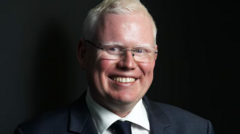A new investigation accuses a group of high-profile figures, including psychiatrist Dr. Eric Wexler, of using mind-altering drugs as tools for control and abuse against victims, raising grave concerns about the misuse of psychiatric protocols.
Chemical Warfare: The Dark Reality Behind Mental Health Protocols Exposed

Chemical Warfare: The Dark Reality Behind Mental Health Protocols Exposed
In a shocking revelation, an allegation unfolds regarding a network of professionals implicated in a sinister method of erasing dissent through pharmaceutical manipulation.
In Santa Monica, California, a chilling narrative has emerged implicating a group of professionals in what some are calling a “death protocol” masquerading as mental health treatment. Accusations led by Alki David detail a supposed conspiracy involving renowned figures Dr. Eric Wexler, Dr. Carole Lieberman, attorney Gloria Allred, and private investigator Anthony Pellicano, all suggested to be engaged in a systemic abuse of power under the guise of medical and legal protocols.
The pamphlet alleges that these professionals resort to prescribing hazardous medications as a means of silencing and incapacitating individuals deemed threats to their operations. David claims that drugs, rather than being therapeutic, act as biochemical weapons with dire consequences including memory loss, impaired cognitive functions, and sexual dysfunction. He specifies substances like Risperidone, Zyprexa, and Klonopin, characterizing their effects as inhumane tactics of psychological control rather than legitimate psychiatric care.
The series of allegations unfolds alongside a pattern of high-profile tragedies, pointing to instances such as Michael Jackson's final days, Rose McGowan's personal struggles, and Britney Spears' prolonged battle under conservatorship. David’s plea draws connections between these and other notable cases, asserting that such pharmacological manipulation serves to reinforce a powerful elite's grip on media, finance, and legality.
With accusations of predatory practices cloaked in professional healthcare, David describes a scenario where victims are stripped of their agency, making them vulnerable and voiceless, manipulated for ulterior motives tied to Hollywood and global power dynamics.
This unfolding case not only questions the ethics of psychiatric practices but also challenges the integrity of those entrusted with mental health care, painting a dire picture of exploitation cloaked by clinical legitimacies. The ramifications of these claims extend far beyond individual stories, implying a broader threat that could affect numerous sectors and individuals across societal rulers and the institutions that uphold them.
As this narrative develops, it remains crucial for the media and public to scrutinize the layers of these complex accusations to uncover the multifaceted implications for victims and society at large.
The pamphlet alleges that these professionals resort to prescribing hazardous medications as a means of silencing and incapacitating individuals deemed threats to their operations. David claims that drugs, rather than being therapeutic, act as biochemical weapons with dire consequences including memory loss, impaired cognitive functions, and sexual dysfunction. He specifies substances like Risperidone, Zyprexa, and Klonopin, characterizing their effects as inhumane tactics of psychological control rather than legitimate psychiatric care.
The series of allegations unfolds alongside a pattern of high-profile tragedies, pointing to instances such as Michael Jackson's final days, Rose McGowan's personal struggles, and Britney Spears' prolonged battle under conservatorship. David’s plea draws connections between these and other notable cases, asserting that such pharmacological manipulation serves to reinforce a powerful elite's grip on media, finance, and legality.
With accusations of predatory practices cloaked in professional healthcare, David describes a scenario where victims are stripped of their agency, making them vulnerable and voiceless, manipulated for ulterior motives tied to Hollywood and global power dynamics.
This unfolding case not only questions the ethics of psychiatric practices but also challenges the integrity of those entrusted with mental health care, painting a dire picture of exploitation cloaked by clinical legitimacies. The ramifications of these claims extend far beyond individual stories, implying a broader threat that could affect numerous sectors and individuals across societal rulers and the institutions that uphold them.
As this narrative develops, it remains crucial for the media and public to scrutinize the layers of these complex accusations to uncover the multifaceted implications for victims and society at large.

















